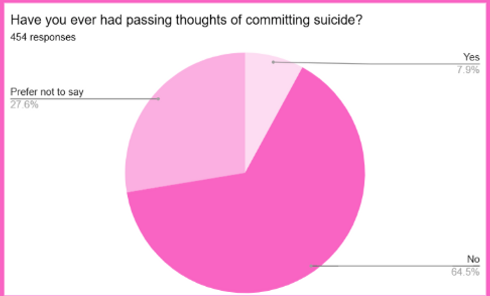At Mind Over Matter, our mission is to spread awareness about dysthymia, a mental health condition that is often overlooked yet deeply impactful. To better understand how we can make our message clear, engaging, and informative, we launched a research study aimed at identifying the prevalence of low-level depressive symptoms and dysthymia among teens and exploring ways to address these issues.
We kept our survey open for the first three months of our campaign, open to individuals aged 11-18. The survey was shared through schools in the Cherry Creek District and promoted across our TikTok, Instagram, and X accounts. Our questions focused on understanding feelings of stress, loneliness, low energy, hopelessness, and self-criticism, as well as participants' awareness of dysthymia and coping techniques like mindfulness and stress management.
With guidance from our mental health consultants, Dr. Nick Liguori and Emily Kauth, we designed a process that was straightforward for participants while providing valuable insights into how low-level depressive symptoms and dysthymia manifest in everyday life. This study allowed us to identify common struggles among teens, gauge the impact of these symptoms on well-being, and explore the effectiveness of mindfulness and philanthropy as protective factors. By understanding these experiences, we aim to create meaningful resources and foster a supportive, informed community. Please scan the QR code to answer the research questions yourself for our next wave!

The results from our research study provided evidence that our protective factors, mindfulness, routines, help outreach, and relationships, had a positive impact on the risk factors associated with low-level depressive symptoms and dysthymia. Participants reported decreased levels of stress, loneliness, and self-criticism after engaging in the activities we provided. As shown in the graphical data below, mindfulness was most effective in reducing self-criticism and enhancing emotional well-being, while mindfulness had the greatest impact on alleviating feelings of loneliness and fostering social connection.
These findings help demonstrate the tangible benefits of our campaign’s content on teen mental health and provide a foundation for tailoring future resources to maximize impact. We aim to share these results with our community to emphasize the importance of implementing accessible mental health practices.
RESULTS
1

3

5

7

9

11

13

15

17

19

2

4

6

8

10

12

14

16






